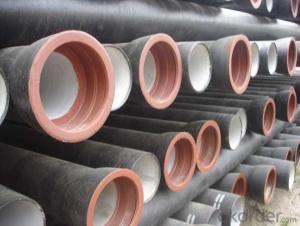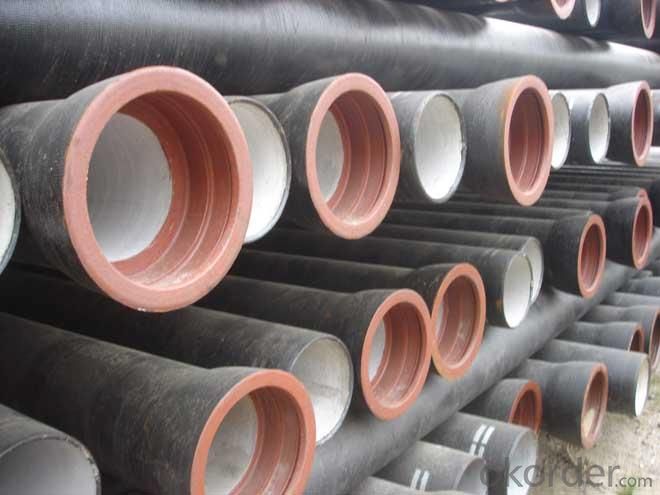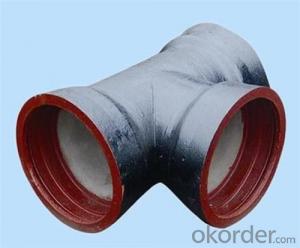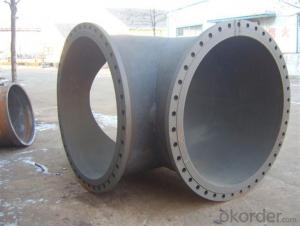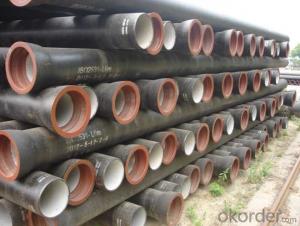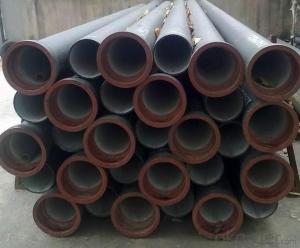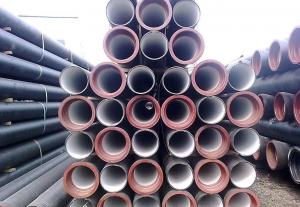Ductile Iron Pipe EN545 DN300 High Quality
- Loading Port:
- China main port
- Payment Terms:
- TT OR LC
- Min Order Qty:
- 999 m
- Supply Capability:
- 9999 m/month
OKorder Service Pledge
OKorder Financial Service
You Might Also Like
1,Ductile Iron Pipe Description :
1) Pipes confirm to ISO2531,K9 class,T type joint,6m long,with inside cements lining conform to ISO4179, outside Zinc spraying(130g/m2) and bitumen coating(70μm) conform to ISO8179.
2) Pipe ends: Spigot and socket ends, with 100% SBR rubber gaskets accoding to ISO4633
3) we can do third party inspection according to customer's request.
2,Main Features of the Ductile Iron Pipe:
1. Material: Ductile iron grade 500-7/ 450-10 in accordance with ISO1083
2. Standard: ISO 2531, EN545, EN598, ANSI, AWWA
3. Certificate: ISO9001, ISO14001, SGS, NSF, WRAS
4. Test: In accordance with ISO 2531 / EN 545 / EN598 and 100% water pressure test
5. Internal Lining: Cement, conform to ISO4179
3,Ductile Iron Pipe Images:
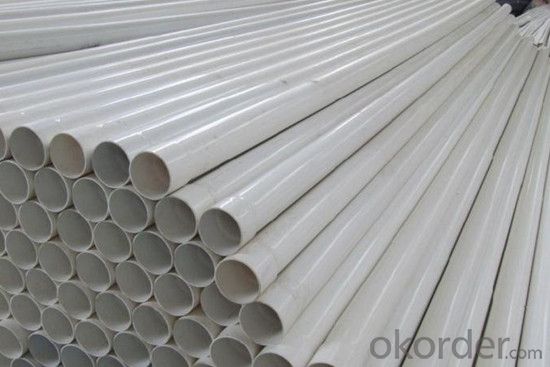
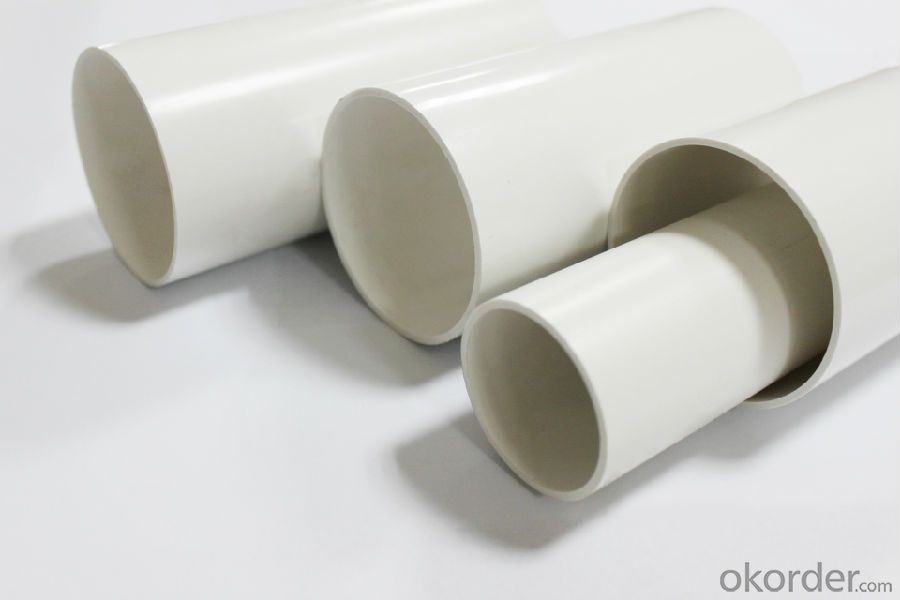
4. Ductile Iron Pipe Specification
Standard: API SPEC 5L 44th eidtion,ASTM A252-98(2007)
Grade: A53 Grades A/B, ASTM A106 Grades B/C,ASTM A179 AWWA, C200, ASTM A139, ASTM A120, X42, X52, X56, X60, X65, X70, X80, X100
Weld Alternatives: LSAW
OD size range: 6.4~44.5mm
Wall thickness: 406.4~1422mm
Length: 3-12 m according to requirment
Note: Other grade can also be provided after consulting. Special design are available for coal slurry conveyance LSAW line tube -- Service
5.FAQ:
1.Q: Why would you choose ductile iron pipe rather than other pipe materials?
A:The reasons are obvious for that not only ductile iron pipe possesses the inherent strength and flexibility of ductile iron, combined with proven corrosion protection systems, but also the cost savings can be achieved from design to installation and commissioning.
2.Q:Why can you guarantee the inner of pipes can’t be corroded?
A: High alumina cement mortar lining and sulphate-resistant cement mortar lining. These two special linings are applicable to inner anti-corrosion for sewage pipes, improving resistance to erosion of the sewage components.
- Q: What is the relationship between continuous cast iron pipe and ductile iron pipe?
- Continuous cast iron pipes are usually grey cast iron pipes. Its tensile strength and elongation are much lower than those of nodular cast iron. In chemical composition, grey cast iron has less carbon content than nodular cast iron. According to the organization, the graphite form of gray iron is flaky, and the graphite form in spheroidal graphite cast iron is spherical.
- Q: What are the specifications of cast iron pipes?
- To be divided into: cast cast pipe. Cast iron pipes are used for water supply, drainage and gas transmission lines. They include cast iron pipes and pipe fittings. Labor intensity is small. According to the casting method, it is divided into continuous cast iron pipe and centrifugal cast iron pipe, in which the centrifugal cast iron pipe is divided into sand mould and metal type two kinds. Divided into gray cast iron pipe and nodular cast iron pipe according to different material. Rubber ring seals for flexible interfaces,
- Q: Are ductile iron pipes suitable for use in irrigation sprinkler systems?
- Ductile iron pipes, known for their durability, strength, and corrosion resistance, are a suitable option for irrigation sprinkler systems. With their high tensile strength, they can withstand heavy loads and high pressure, ensuring a consistent water supply. Moreover, their long lifespan reduces the frequency of maintenance and replacement, making them cost-effective. In summary, ductile iron pipes are reliable and appropriate for use in irrigation sprinkler systems.
- Q: Can ductile iron pipes be used for underground irrigation systems?
- Indeed, underground irrigation systems can utilize ductile iron pipes. These pipes find extensive use in a multitude of applications, such as water supply and distribution systems. Renowned for their robustness, durability, and resistance to corrosion, ductile iron pipes prove ideal for subterranean installations. Moreover, they possess exceptional pressure-bearing capabilities, enabling them to endure the elevated pressures commonly associated with irrigation systems. Nevertheless, it remains crucial to guarantee appropriate installation and maintenance to avert any potential harm or leakage within the system.
- Q: Do ductile iron pipes require internal linings for potable water?
- No, ductile iron pipes do not require internal linings for potable water. Ductile iron is a type of iron that has been treated to enhance its strength and flexibility. It is commonly used for water distribution systems due to its durability and resistance to corrosion. Unlike other materials, such as cast iron or steel, ductile iron pipes have a protective layer called a cement-mortar lining, which provides an effective barrier against corrosion and prevents the leaching of any harmful substances into the water. This lining is applied during the manufacturing process and is designed to withstand the corrosive properties of potable water, making internal linings unnecessary. Additionally, the smooth surface of ductile iron pipes helps to maintain the quality and flow of water without the need for additional linings.
- Q: What is the excavation width of ductile iron pipes with diameters greater than 1400?
- Because of differences in depth and soil properties, the excavation width is differentUsually to ensure that the width of bottom surface on both sides of the 600 1400+ manual operation. (such a large pipe flange bolt, the tool is not easy to expand, so the need for manual operation. So wide)
- Q: How is ductile iron pipe tested for quality?
- Ductile iron pipe is tested for quality through various methods, including visual inspection, hydrostatic pressure testing, and mechanical property testing. Visual inspection ensures that the pipe is free from any visible defects or imperfections. Hydrostatic pressure testing involves subjecting the pipe to water pressure that exceeds its maximum working pressure to check for any leaks or failures. Mechanical property testing assesses the pipe's strength, toughness, and other mechanical properties through tests such as tensile strength, yield strength, and elongation. These quality tests help ensure that ductile iron pipes meet the required standards and are suitable for their intended applications.
- Q: Does the cast iron have size 250? What's the performance?
- You should be the casting grade or material, if it is ductile iron, said generally between QT400-15 or QT700-2 different indicators, said in front of the tensile strength, the elongation rate refers to the back, China is now the lowest grade of nodular cast iron material is QT400-15, such as QT250.In addition, the number 250 you refer to may also be a code name for ductile iron parts, such as 200, 300, etc., which are manufactured by the factory as required by the project.Gray iron, which has a 250 brand, is generally referred to as HT250, but it is not ductile iron.The machine on the ductile iron and gray iron are used, but generally not made of grey cast iron gear
- Q: Why does the cast iron pipe always run off when testing?
- If the pipe is exposed for pressure test, you must add a pier, or else the fittings fly out. You are not surprised. At the same time, the pressure test before the ink tube to make full immersion bubble discharge clean, or a big easy gas pressure pipe explosion.
- Q: How much is the working pressure of ductile iron pipe used in water supply pipe and how is MPa determined?
- Upstairs are positive solutions, but now outdoor buried water pipes are using steel wire mesh skeleton, plastic composite pipe instead of ductile iron pipeThe general pressure grades used for water supply pipes are 1.0MPa and 1.6Mpa
Send your message to us
Ductile Iron Pipe EN545 DN300 High Quality
- Loading Port:
- China main port
- Payment Terms:
- TT OR LC
- Min Order Qty:
- 999 m
- Supply Capability:
- 9999 m/month
OKorder Service Pledge
OKorder Financial Service
Similar products
Hot products
Hot Searches
Related keywords
